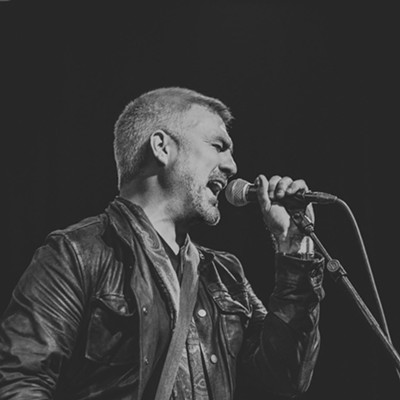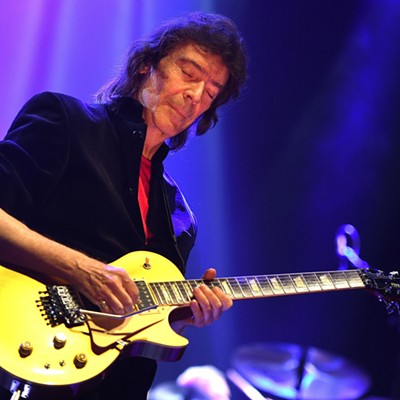As a teen in small-town Wisconsin, John McCutcheon learned to play the guitar and write songs from a Woody Guthrie book he picked up from the local library. Flash forward a half century, and McCutcheon's 37th album is a tribute to one of Guthrie's heroes, the songwriter and union activist Joe Hill, whom McCutcheon calls the "ultimate utilitarian songwriter."
McCutcheon will headline the 31st Annual Tucson Folk Festival, performing at 9 p.m. on Saturday, April 30. This is McCutcheon's first time at the Tucson Folk Festival, but he says he's heard about it for years. In the folk music world, it's a festival notable for being about the shared love of the music, celebrating songs in the tradition of non-commercial icons like Guthrie and Hill, he says.
"There are plenty of festivals that I play that are really geared toward 'Let's get the biggest names we can' and then there are the festivals—and Tucson is not the only one, but it certainly is a notable one—where people come to play and to see each other," McCutcheon says. "This is a celebration of this important thing that a group of people have discovered in common."
Presented by the Tucson Kitchen Musicians Association and always free, the festival features more than 120 artists from Tucson and around the country on five downtown stages. Headliners, in addition to McCutcheon, include James Reams & The Barnstormers, Nancy McCallion and The Scarlet Letterman. Other local favorites performing include Run Boy Run, the Greg Morton Band, Kevin Pakulis, Heather Hardy and the Salt of the Earth Band, Laura and the Killed Men, John Coinman and Amber Norgaard.
The festival's annual songwriting contest was renamed this year in honor of the late Stefan George, a 2013 festival headliner who passed away in 2015.
Festivals like the Tucson Folk Festival are great not only for the music fans, but the performers themselves when they're not on stage, McCutcheon says.
"Unlike other adults, musicians don't have conventions. This is the closest we have to such things," McCutcheon says. "It's the only time you're really around other people who do the same kind of work you do. It's a great opportunity to see your friends and make new ones and find out that you're not crazy, you're not the only person who does this totally upside-down kind of work."
Having released his first album in 1975, the multi-talented McCutcheon has earned a reputation as folk music's Renaissance man. In fact, his website since the mid-90s has simply been folkmusic.com. A seven-time Grammy nominee, McCutcheon is a multi-instrumentalist, songwriter, storyteller and activist whom Johnny Cash asked to perform at his daughter Roseanne's wedding, calling McCutcheon "the most impressive instrumentalist I've ever seen."
For McCutcheon, it all goes back to Woody Guthrie and the only book he could find about learning to play guitar.
"The first 50 songs I learned were Woody Guthrie songs, and I wasn't learning them because they were Woody Guthrie songs. They were just in this book. It was the only book in our library that had those little guitar grids that showed you where to put your fingers. I had to figure out how to teach myself, and this book was my primer," he says.
But even as he learned the chords and became a guitar player, the deeper lesson was in the songs themselves and how anything in life could be expressed through music.
"At the same time, I was cognizant of the fact that here's a love song, here's a historical song, here's a kids song, here's a topical song, and here's a song about his time in the Merchant Marines, and here's an anti-Hitler song; and they're all by the same guy," McCutcheon says. "Really what that did is taught me, not only about playing the guitar, but about writing, and what you write and who you write for. That's the biggest take away."
Forty years after finding that library book, McCutcheon did a Woody Guthrie tribute album for Guthrie's 100th birthday and says, "it felt like a debt repaid in some small way." Then in 2015, McCutcheon turned his attention to Joe Hill, a Swedish immigrant and International Workers of the World organizer who used his songs to call on workers to organize. But rather than simply strum his guitar, McCutcheon recorded Joe Hill's Last Will with full arrangements, adding piano, horns, strings and percussion.
"I wanted to really try to do the songs the way that I imagined Joe might have heard them," he says. "He was a utilitarian type songwriter. He never did a gig, never made a recording, was never on the radio, but his songs were based on Vaudeville and church hymns and Tin Pan Alley songs and things like that. I wanted to put them in those settings.
"He's one of the most important songwriters in the folk music world and the political music world that nobody really knows about. For most Americans, Joan Baez singing 'I Dreamed I Saw Joe Hill Last Night' at Woodstock is about as far as it goes. But if it weren't for Joe Hill there wouldn't have a been a Woody Guthrie and connect the dots past that, it's entirely possible there wouldn't have been a Bob Dylan."
Next, McCutcheon will take a pause from what he calls his "endless tour" to return to the studio in June to record an album or two of his own songs. Looking ahead to album number 38, he's proud to still be at it, happy to still be excited by the possibility of all the things he can say in the simple format of folk music.
"Here I am in my 64th year and I still get up in the morning, and I can't wait to do my job. I love the fact that I have this creative outlet in my life," he says. "I'm around a lot of young musicians who are adding energy to what I've been involved in and it's pretty fabulous."







